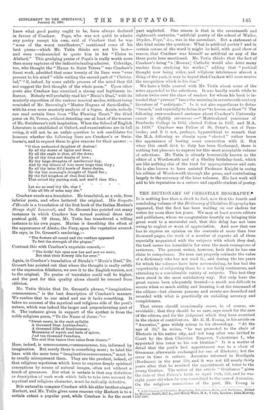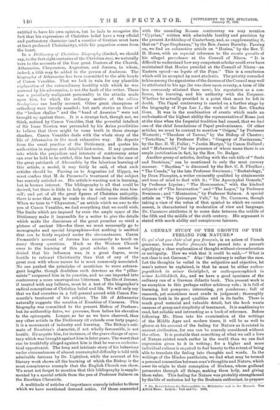THE DICTIONARY OF CHRISTIAN BIOGRAPHY.* IT is nothing less than
a shock to find, now that the fourth and concluding volume of the Dictionary of Christian Biography has appeared, that the first has been waiting on our shelves for notice for more than ten years. We may at least assure editors and publishers, whom we congratulate heartily on bringing this great work to a successful end, that this delay has not been owing to neglect or want of appreciation. And now that one has to express an opinion on the contents of more than four thousand pages, the work of a number of experts all of them especially acquainted with the subjects with which they deal, the task seems too formidable for even the most courageous of reviewers. The present writer, however, feels that be has one claim to competence. No man can properly estimate the value of a dictionary who has not used it ; and during the ten years for which the volumes have been accumulating, he has had the opportunity of subjecting them to a use fairly continuous, and extending to a considerable variety of subjects. This test they have stood in the most satisfactory way. Not only have the great names been adequately treated—a result not difficult to secure when so much ability and learning is at the command of the editors—but obscure persons and events are described and recorded with what hi practically an unfailing accuracy and completeness.
That errors should occasionally occur, is, of course, un- avoidable; that they should be so rare, says much for the care of the editors, and for the judgment which they have exercised in the choice of contributors. Mr. E. M. Young, in his article on "Ausonius," goes widely astray in his chronology. "At the age of 30," he writes, "he was promoted to the chair of Rhetoric in his native city, and not long after was invited to Court by the then Christian Emperor, Valeutinian I., who appointed him tutor to his son Gratian." It is a matter of detail that the poet's first appointment was to a chair of Grammar, afterwards exchanged for one of Rhetoric ; but the error in time is serious. Ausonius returned to Burdigala
(Bordeaux) in the year 339, and it was not till nearly thirty years after that he received the appointment of tutor to the young Gratian. The writer of the article " Gratianus " gives the date of that Prince's birth as April 18th, 359, and he was eight years old when he was committed to the care of Ausonius. On the religious convictions of the poet, Mr. Young is • A Dictionary of Christian Biography, Literature, Sects, and Doctrines. Edited by William Smith, D.C.L., and Henry Waco, MA. 4 rola, London ; John 'Murray. 1877-1887.
entitled to have his own opinion, but he fails to recognise the fact that his expressions of Christian belief have a very official and perfunctory character (and a courtier of Gratian must have at least professed Christianity), while his paganism comes from the heart.
In a Dictionary of Christian Biography (limited, we should say, to the first eight centuries of the Christian era), we naturally turn to the accounts of the four great Doctors of the Church, Athanasius, Chrysostom, Augustine, and Jerome, to whom, indeed, a fifth may be added in the person of Ambrose. The biography of Athanasius has been committed to the able hands of Canon Venables. That we look in vain for any plausible explanation of the extraordinary hostility with which he was pursued by his adversaries, is not the fault of the writer. There was a peculiarly malignant personality in the attacks made upon him, for which the ordinary motive of the odium theolog 'cum can hardly account. Other great champions of orthodoxy were fiercely assailed ; but such stories as those of the "broken chalice" and the "hand of Arsenius " were not brought up against them. It is a strange fact, though not, we think, noticed by Canon Venables, that the powerful intellect of Sir Isaac Newton was persuaded by his Arian proclivities to believe that there might be some truth in these strange slanders. Canon Venables deals with the whole story of the life of Athanasius in the most exhaustive way. He departs from the usual practice of the Dictionary, and quotes his authorities in copious and detailed foot-notes. If any question into which the prejudices and interests of controversy enter can ever be held to be settled, this has been done in the case of the great patriarch of Alexandria by the laborious learning of this article, a model, it may fairly be said, of what such articles should be. Passing on to Augustine (of Hippo), we must confess that M. de Pressens6's treatment of the subject has scarcely satisfied us. His article is wanting not in learaing, but in human interest. The bibliography is all that could be desired, but there is little to help us in realising the man him- self; and yet, of all the great figures of Christian antiquity, there is none that may be made to stand out more distinctly. When we turn to " Chysostorn," an article which we owe to the pen of Canon Venables, we find everything that we could wish. The limits which are imposed by even the ample space of the Dictionary make it impossible for a writer to give the details which make the discourses of the great preacher so vivid a picture of ancient life—for these we must necessarily go to monographs and special biographies—but nothing is omitted that can be fairly required under the circumstances. Canon Fremantle's account of Jerome has necessarily to touch on many thorny questions. Much as the Western Church owes to the learning of this great scholar, it cannot be denied that his influence was, in a great degree, more hostile to rational Christianity than that of any of the great men with whose names he is most commonly associated. No one pushed the principles of asceticism to more extrava- gant lengths, though doubtless such devotees as the " pillar- saints " surpassed him in its practice, and no one imported into controversy a more unscrupulous bitterness. The life of Jerome, if treated with any fullness, must be a test of the biographer's radical conceptions of Christian belief and life. We will only say that we find ourselves in a full general accord with Canon Fre- mantle's treatment of his subject. The life of Athanasius naturally suggests the mention of Eusebius of Cassarea. This biography was committed to the present Bishop of Durham; but its authorship dates, we presume, from before his elevation to the episcopate. Longer, as far as we have observed, than any other article in the Dictionary (it extends over forty pages), it is a monument of industry and learning. The Bishop's esti- mate of Eusebius's character, if not wholly favourable, is not hostile. He acquits him, for instance, of the grave charge of apos- tacy which was brought against him in later years. The worst that can be truthfully alleged against him is that he was an ecclesias- tical opportunist. The long and intricate story of his behaviour under circumstances of almost unexampled difficulty is told with admirable fairness by Dr. Lightfoot, while the account of his literary work shows all the learning of which the Bishop is the most conspicuous example that the English Church can show. We must not forget to mention that this bibliography is supple- mented by a special article from the pen of Professor Salmon on the Ensebian Chronicle.
A multitwle of articles of importance scarcely inferior to those which we have mentioned demand notice. Of those connected with the unending Roman controversy we may mention " Cyprian," written with admirable lucidity and precision by the present Archbishop of Canterbury, and, as supplementing it, that on" Pope Stephanns," by the Rev. James Barmby. Passing on, we find an exhaustive article on "Rosins," by the Rev. T. D. Morse, with an especial reference to the vea:ata quwstio of his alleged precedence at the Council of Nica3a. " It is difficult to understand how any competent scholar could ever have maintained that Hosing presided at the Council of Nicala—an Eastern synod—as legate of the Pope." This is a conclusion which will be accepted by most students. The priority conceded to him among the signatories of the decrees of the Council may well be attributed to his age (he was close upon seventy, a term of life less commonly attained than now), his reputation as a con- fessor, his learning, and his authority with the Emperor. Whether he actually presided is a point that must be left in doubt. The Papal controversy is carried on a further stage by the biography of Pope Leo I., the work of the Rev. Charles Gore. It was in the combination of events which made an ecclesiastic of the highest ability the representative of Rome just at the time when the Imperial tradition had ceased, that we find one of the chief foundations of Papal predominance. Of other articles, we must be content to mention " Origeu," by Professor Westcott ; "Theodore of Tarsus," by the Bishop of Chester ; " Tertnllian," by Professor Fuller ; "Gregory of Nazianzum," by the Rev. H. W. Fuller; "Justin Martyr," by Canon Holland ; and " Muhamuni,d," for the presence of whose name there is an ample justification in fact, by the Rev. Dr. Badger.
Another group of articles, dealing with the sub-title of" Sects and Doctrines," can be mentioned in only the most cursory manner. " Baptism " is discassed by the Rev. C. S. Ffoulkes ; "The Creeds," by the late Professor Swainson ; "Eschatology," by Dean Plumptre, a writer eminently qualified by attainments and tone of mind to deal with it ; "The Apocryphal Gospels," by Professor Lipsins ; "The Holism:fusion," with the kindred subjects of "The Incarnation" .and "The Logos," by Professor Sveainson ; and " Montanism," by Professor Salmon. A special article on "The Quicanque Vult," by Dr. Cazenove, though taking a view of the value of that symbol to which we cannot assent, is characterised by moderation of view and language. Dr. Cazenove attributes it to some date between the middle of the fifth and the middle of the sixth century. His argument is stated with much ability and conspicuous fairness.



















































 Previous page
Previous page